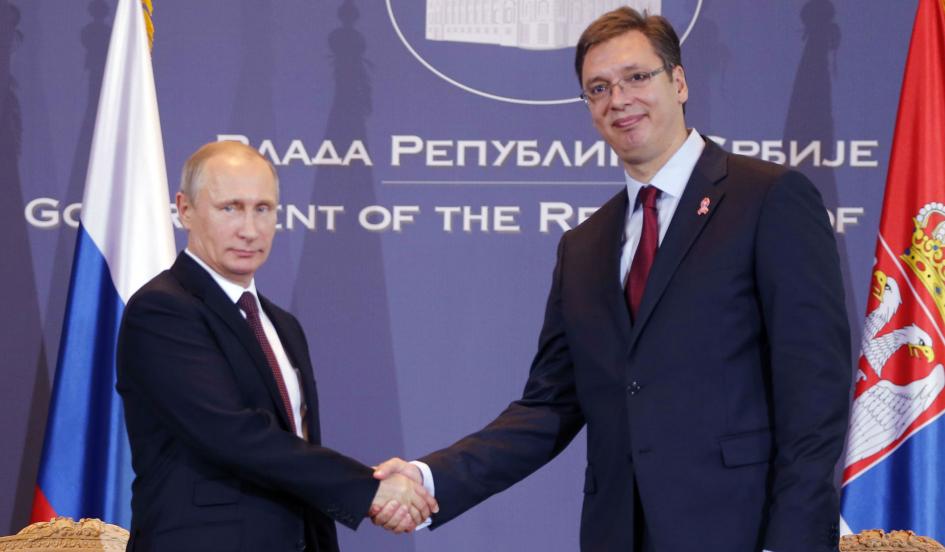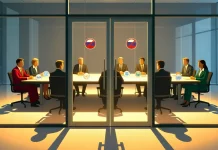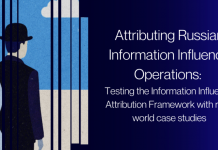
This past November, Russia’s Berlin ambassador, Vladimir Grinin, invited two representatives of the surging new party Alternative für Deutschland (AfD) for a meeting. According to German news media, Grinin offered the party strategic advice. In an email to Newsweek, the embassy declined to comment on the meeting, but one of the guests was more forthcoming. “The background is that [the tabloid] Bild reported that [Vladimir] Putin was trying to influence AfD by offering us loans and gold bars, but we were unaware of any such attempts,” explains Christian Lüth, the party’s communications director. “We even double-checked our gold inventory, but there’s nothing there from Russia. So I called up [Grinin], who said that he doesn’t comment on news stories but that he’d be happy to meet. We spoke about our respective positions on different issues, but that’s something we do with many ambassadors.” Other political parties do the same with various ambassadors, Lüth notes.
Nevertheless, news of the meeting raised eyebrows around Europe. A couple of months earlier, Grinin had had two other AfD politicians over for a meeting. Also last autumn, the Russian-affiliated First Czech Russian Bank gave a €9.4m loan to the French right-wing party Front National, and FN leader Marine Le Pen visited Moscow to discuss policy issues with Deputy Prime Minister Dmitry Rogozin and other officials. The leader of Austria Freedom Party (FPÖ), Heinz-Christian Strache, also visited the Russian capital on a self-described confidence-building mission. Then, after a recent visit to Crimea and Moscow, where he met with top officials, Italian far-right party Lega Nord’s leader, Matteo Salvini, praised the Russian capital’s safe underground system and announced that “Russia wants dialogue”. Finally, Jobbik, which became Hungary’s third largest party in last year’s elections, maintains particularly close relations with the Kremlin. In a recent speech in Moscow, Jobbik party leader, Gábor Vona, denounced the US as “the deformed offspring of Europe”, and the party’s chief foreign policy expert, Béla Kovács, has even been accused of spying for Russia.
Kovács is an MEP. So are two fellow Jobbik members, five Lega Nord members, four from FPÖ, three from Greece’s Golden Dawn, two from the far-right Sweden Democrats, one from Belgium’s Vlaams Belang and 23 members of FN, now France’s largest party in the EU’s legislating body. In addition to these committed supporters of Russia, the current European Parliament comprises parties such as Poland’s Nowa Prawica and Britain’s UKIP, which maintain an open attitude towards the superpower in the East. In fact, nowhere does Russia have more elected friends than in the EU’s legislative body. And while Moscow’s interest in European fringe parties isn’t news, their political clout is. “One fifth of MEPs now belong to radical, fringe and non-mainstream parties,” explains Péter Krekó, director of Political Capital Institute, a Budapest-based research group, and author of a recent report on Russia’s connections with European radicals. “By maintaining close connections with these parties, Russia can destabilise Europe from within, now especially in the European Parliament, and at the same time legitimise Russia’s actions.”
The friendship goes beyond kind words. Last spring MEPs and national politicians from mostly radical parties travelled to Crimea to observe the disputed annexation referendum, roundly declaring it free and fair. “What I saw was that residents were really free to vote the way they wanted,” reports Fabrizio Bertot, an Italian MEP from the centre-right, who observed both the referendum and the elections in eastern Ukraine. “I spoke with people in Crimea, including the Italian community there, and it was a fair vote. The legal aspects of the referendum are the domain of international institutions, and it’s not my job to determine whether these votes were legitimate or not. But the political aspect, the will of the people, is important too.” Instead of criticising Russia, says Bertot, the West should engage in dialogue. (And the sanctions are hurting Italy’s cheese exports.)
Kovács, too, belonged to the Crimea observer group, as did Aymeric Chauprade, an MEP for FN, Austrian MEP Ewald Stadler, members of Germany’s post-Communist Die Linke as well as members of FPÖ, Lega Nord and assorted other far-right and far-left parties. They observed the referendum even though the Organisation for Security and Co-operation in Europe, which ordinarily supplies election observers, had dismissed it as illegal. “The people of eastern Ukraine are Russian, and they accepted to stay in Ukraine,” says Bertot, who describes himself as “pro-Italian, not pro-Russian”. “When they saw that the Ukrainian government was pursuing stronger relations with the EU, they said, ‘We don’t want to be like Greece; it’s better to be with Russia’.” Kovács and Chauprade did not respond to interview requests.
One fifth of MEPs is far from a majority, but surging radical parties are beginning to shape the public debate. “We, the mainstream, are stuck,” says Indrek Tarand, an Estonian MEP and former presidential candidate. “We keep repeating the same phrases, such as ‘We need more Europe’, which makes us seem like we’re from another planet. If we had more inspirational leadership, we could invite them to a discussion and wear them out.” When the Council of Europe suspended Russia last autumn, Jobbik and Die Linke representatives voted against the move.
Friendship with Russia can be a matter of convenience; Krekó notes that in Jobbik’s early, cash-strapped days, Kovács provided money then steered the party in a pro-Russian direction. (A Jobbik spokesperson was not immediately available for an interview.) It other cases, it’s based on ideological affinity, with both the far left and the far right finding aspects to admire in Putin’s Russia. Either way, it’s a win-win.
And while the large pro-Moscow contingent in Brussels and Strasbourg can affect European unity, in some capitals their power is far more concrete. Bulgaria’s far-right Ataka, which was founded in 2005 and won 5% of the vote in this year’s parliamentary elections, vowed to topple the government if it backed sanctions against Russia and unabashedly professes its allegiance to Moscow. It is touching a nerve: in a poll earlier this year, 22% of Bulgarians said they’d vote to join Putin’s Eurasian Union, while 40% supported EU membership.
Given the collective lament of far-right parties over eastern-European immigrants, Bulgarians’ interest in the Eurasian Union may not be all that surprising. And, on a national level, Serbia, which seems to be getting a cold shoulder from the EU, is pursuing friendship with Russia. “The government is paying lip service to EU integration because that’s what’s keeping it in power, but at the same time it’s opening a space in Serbian society for Russia,” argues Jelena Milić, director of the Center for Euro-Atlantic Studies, a Belgrade think tank. “Formally our EU admission process is ongoing, but now we’re getting negative messages from the EU regarding our political harmonisation [with the EU]. It’s in that context that Russia is presenting itself as an attractive option.” On a visit to Serbia last autumn, Putin promised to support it on the divisive issue of Kosovo. Russia Today, Russia’s fast-growing news service, is due to open an office in Belgrade next spring.
Foreign Minister Ivica Dačić, leader of the post-Communist SPS party and nominally pro-EU, now makes regular trips to Moscow, including one in October and one just before Christmas. “Moscow plans to develop global security cooperation with its traditional ally Serbia,” Russia’s foreign ministry announced after Dačić’s December meetings. Russian Foreign Minister Sergey Lavrov, for his part, dismissed as “neo-colonial slang” EU leaders’ concerns that Russia is exerting pressure on Serbia. “SPS is essentially in power because [Russian energy giant Gazprom] installed them and because our crooked political system that enables them to raid local authorities,” says Milić. “Since the Russians installed them, of course they have to defend Russia.” A Foreign Ministry spokeswoman didn’t respond to a request for an interview with Dačić.
Radical parties concerned about eastern European immigrants on one hand, a strategic eastern European country growing closer to Moscow on the other: with the European dream of unity in tatters, Russia’s eclectic friendship strategy is working. And if the financial aspect doesn’t violate party financing laws, what’s wrong with such relationships? Countries from the US to China maintain contacts with political parties abroad, and especially following the fall of communism, Western money flowed freely to new parties. “If we say that American money is OK, why not Russian money?” asks Tarand. “Who decides which money stinks? This is why Estonian lawmakers have banned foreign donations.” Le Pen explained that FN accepted its Russian loan because French banks had turned the party down.
Lüth, while emphasising that AfD gets neither money nor advice from Moscow, says he understands why people might suspect such goings-on: “I can see how people would get the idea that we would be a target for Russian financial support, but we’re obviously not as radical as the FN. And we don’t need financial support.” That raises the obvious question: if institutions at home gave parties like FN a warmer embrace, would the allure of Moskva fade?
By Elizabeth Braw, Newsweek






